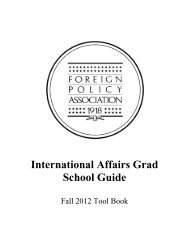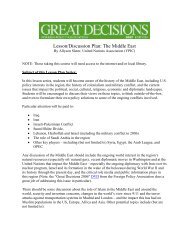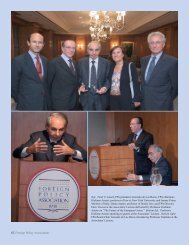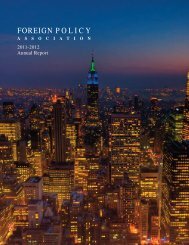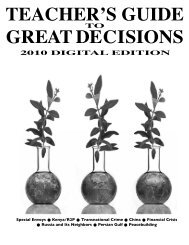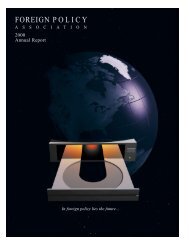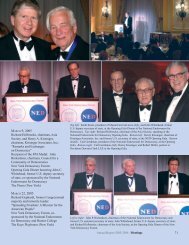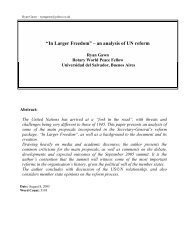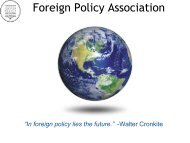Celebrating 90 Years - Foreign Policy Association
Celebrating 90 Years - Foreign Policy Association
Celebrating 90 Years - Foreign Policy Association
You also want an ePaper? Increase the reach of your titles
YUMPU automatically turns print PDFs into web optimized ePapers that Google loves.
First, diplomacy can work. Sec-<br />
ondly, bad diplomacy is often<br />
weakness in disguise. Good<br />
diplomacy is the judicious, con-<br />
sistent, and creative use of our<br />
strengths. South Africa has<br />
shown that change is possible<br />
without the use of military force.<br />
of networked people are bringing about new<br />
expectations. Compare the Chinese response<br />
to its earthquake tragedy with the dismal<br />
performance of the Burmese government after<br />
its cyclone disaster. In Burma, the United Nations<br />
had to use its authority to get aid through<br />
to cyclone victims. Burma has no system for<br />
communicating the needs of the people to the<br />
government, and the government has no incentive<br />
to meet those needs.<br />
I talked to the U.N. secretary-general<br />
recently, following his return from Rangoon. He<br />
felt he had made a difference. He felt that he<br />
had made progress in getting the generals there<br />
to allow aid workers to operate freely. The aid<br />
is too late for thousands of people, but Ban<br />
Ki-moon’s efforts are now resulting in relief for<br />
many more people than previously received it.<br />
He has had more success getting aid through<br />
than anyone else has.<br />
Based on all this experience, what are<br />
my conclusions? First, diplomacy can work.<br />
Secondly, bad diplomacy is often weakness<br />
in disguise. Good diplomacy is the judicious,<br />
consistent, and creative use of our strengths.<br />
South Africa has shown that change is possible<br />
without the use of military force if we<br />
align forces for change and show conclusively<br />
that change will take place and that change<br />
will be fairly implemented and help a country’s<br />
citizens.<br />
We are battling now for such change in<br />
Zimbabwe and in Burma and, where we face<br />
a very different set of challenges, in Iran. Our<br />
goal is to change the behavior of the Iranian<br />
regime by political means and by applying<br />
economic pressure. We keep all options on<br />
the table and make sure that we explore all the<br />
diplomatic routes.<br />
Kosovo showed in 1999 that military force,<br />
including peacekeeping, can be an important<br />
tool of diplomacy. But such force must be<br />
deployed powerfully and accurately. Right now,<br />
we cannot accomplish deployment of this kind<br />
in Darfur. The risks of using force in Iran have<br />
to be weighed very carefully. Iraq has shown<br />
that when we intervene militarily, we need to<br />
restore law and order from Day 1, provide essential<br />
services, and lay the basis for effective governance.<br />
This tenet applies to crises elsewhere,<br />
including Afghanistan, Liberia, and Congo. The<br />
United Nations has a lot more to do in post-<br />
FOREIGN POLICY ASSOCIATION | 97<br />
MEETINGS: PRESENTATION BY SIR JOHN SAWERS



